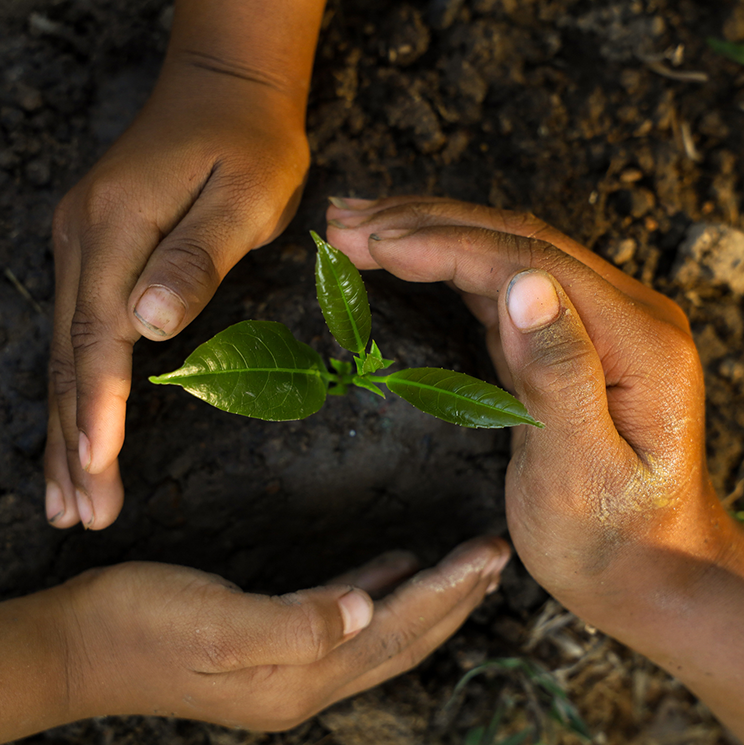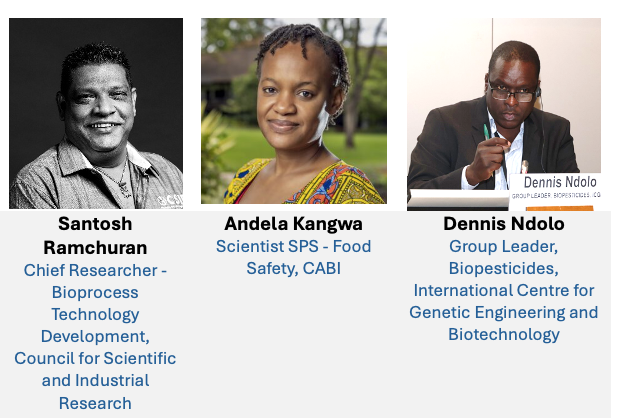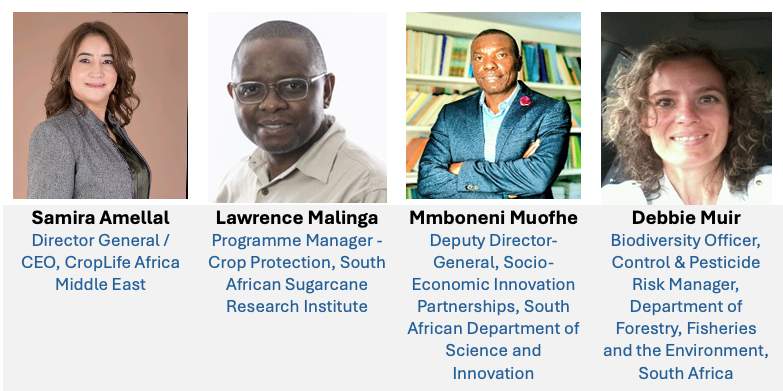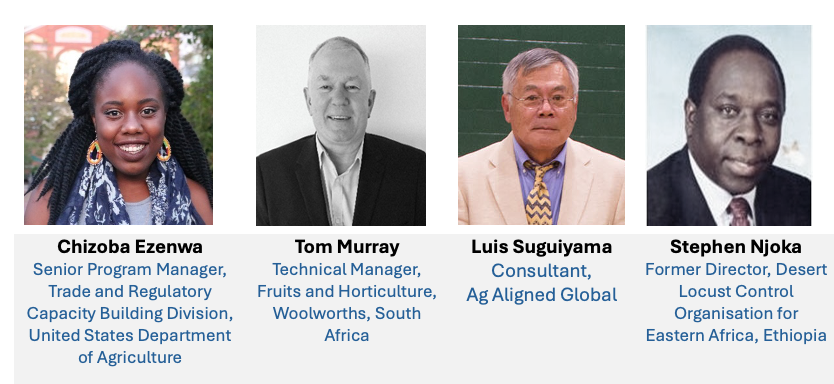
11 - 13 November 2025. Johannesburg, South Africa Arturo Falaschi Conference “Innovative Approaches to Sustainable Pesticide Residue Mitigation”
Organizer: International Centre for Genetic Engineering and Biotechnology (ICGEB) – Cape Town & partner institutions
As Africa strengthens its position in global agricultural trade, the need to align food safety with sustainable farming has never been greater. This high-level international conference brings together researchers, policymakers, industry leaders, and technology providers to explore science-based solutions for managing pesticide residues, with a strong focus on biological solutions, regulatory innovation, and precision agriculture.
Extracts of the programma
Day 1 (11 Nov) — Regulatory Frameworks & Policy Development
- Chair: Dennis Ndolo (Group Leader, Biopesticides, International Centre for Genetic Engineeringand Biotechnology (ICGEB))
- Opening remarks by: Dennis Ndolo
- Samira Amellal (Director General, CropLife Africa Middle East)
- Minshad Ansari (Chair, World Bioprotection Forum & CEO, Bionema Group Ltd)
- Keynote: Luis Suguiyama (Consultant, Ag Aligned Global) — Biopesticide solutions for facilitative trade
- Michelle Lesur (CEO, Andermatt Madumbi Pty Ltd) — Regulatory challenges to biopesticide registration & commercialisation
- Stella Simiyu (Director, Regulatory Affairs & Stakeholder Relations, CropLife Africa Middle East) — Are biopesticides’ harmonisation efforts paying off?
- Travis Bui (Administrative Chair, UAPASTF) — UAV pesticide applications: Industry efforts to enable global regulatory frameworks (virtual)
Afternoon session included
- Murenga Mwimali (Chief Research Scientist, Kenya Agricultural & Livestock Research Org) — Challenges & opportunities in Kenya’s residue compliance.
- Debbie Muir (Biodiversity Officer – Control & Pesticide Risk Manager, DFFE South Africa) — Key provisions of harmonised guidelines for registration of biopesticides in Southern Africa.
- Mellon Kabole (Africa Regional Manager, Minor Use Foundation) — Minor Use Foundation priority setting results for Africa.
Day 2 (12 Nov) — Innovations in Biological Pest Control
- Chair: Stephen Njoka (Former Director, DLCO-EA)
- Keynote: Yrielle Roets‑Dlamini (Senior Researcher – Bioprocess Technology Dev., CSIR) — Scaling & commercialisation pathways: addressing barriers to the growth of biological solutions
- Peter Kamuti (Deputy Director, Kenya Plant Health Inspectorate Service) — Rethinking the last spray: Biopesticides for residue mitigation
- Fernando Cantão (Fundraising/Tech Transfer & Innovation, ICGEB) — The role of biostimulants & biofertilisers in mitigating pesticide residues
- Kahsay Mawcha (Research Fellow – Biopesticides, ICGEB) — Microbes as pesticide clean-up agents: evidence from the literature
Panel:
- Moderator: Debbie Matteucci (Chair, South Africa Bioproducts Organisation)
- Cornelius Oosthuizen (GM, Koppert South Africa), Kenneth Chipere (Principal Research Officer, Pesticides Registration, Zimbabwe),
- Maurice Barasa (Head, Registration of Pesticides, Kenya) & Michelle Lesur (CEO, Andermatt Madumbi)
Day 3 (13 Nov) — Precision Agriculture & Data-Driven Solutions
- Chair: Ramadhan Kilewa (Research Officer, Tanzania Plant Health & Pesticides Authority)
- Keynote: Mmboneni Muofhe (Deputy Director-General, Socio-Economic Innovation Partnership, South Africa Dept. of Science & Innovation) — From data to action: scaling digital tools for farm-level biocontrol
- Tom Murray (Technical Manager, Fruits & Horticulture, Woolworths, South Africa) — From farm to shelf: A retailer’s perspective on pesticide residues
- Stella Simiyu (Director, Regulatory Affairs & Stakeholder Relations, CropLife Africa Middle East) — Regulatory readiness for the use of drones in Africa
- Closing remarks by Minshad Ansari (Chair, World Bioprotection Forum) + Stella Simiyu + Dennis Ndolo
Activity: Launch of the African Bioproducts Community of Practice – led by Dennis Ndolo (ICGEB)
The Biopesticides Community of Practice (CoP) was established under the Collective Action on Agroecology (CA-AE) to accelerate the adoption of safe, effective biopesticides and promote agroecological pest management. It bridges research, industry, policy, and farmer practice to harmonize regulatory frameworks, coordinate innovation, and support evidence-based scaling of biological pest control solutions.
Objectives
- Improve access to and farmer uptake of biopesticides through evidence, policy guidance, and market linkages.
- Harmonize regulatory and Access and Benefit Sharing (ABS) approaches across regions.
- Coordinate fragmented research and innovation across Africa, Asia, and Europe.
- Support evidence-based scaling of biopesticides within Integrated Pest Management (IPM) systems.
- Build a global network for continuous knowledge sharing and policy dialogue on biocontrol solutions.
Linking up with Asian Biopesticide experts:
The Asia‑Pacific Biopesticide Community of Practice (ABCoP), launched by APAARI in May 2024, is a vibrant cross‑sectoral platform that unites researchers, industry stakeholders, policymakers, regulators, NGOs and government agencies across the Asia‑Pacific region. Its primary mission is to promote knowledge exchange, foster collaboration, and accelerate the development, regulation, and trade of biopesticides—a sustainable alternative to conventional chemical pest control.
Related:
GFAIR's Collective Action on Agroecology (CA AE)–Biopesticides initiative took part in the Annual Biocontrol Industry Meeting (ABIM) 2025, held in Basel, Switzerland from 20-22 October 2025, as part of its commitment to advancing sustainable agricultural innovation. ABIM, recognized as the world’s leading biocontrol industry conference, brought together over a thousand experts, researchers, regulators, and industry leaders to exchange insights and foster collaboration on the future of biological crop protection. For CA AE–Biopesticides, this engagement marked an important step toward deepening its involvement in global dialogues that align with Africa’s agroecological transformation agenda.




